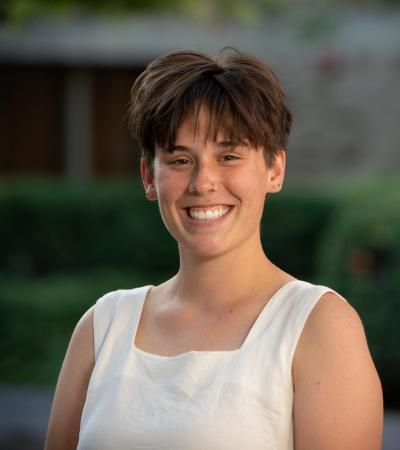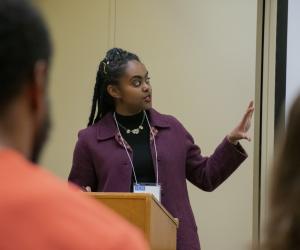This bio is current as of 2021.
Katherine Fugate graduated in May of 2020 with a degree in economics. Right after graduation, Fugate spent six months as an apprentice on a small (~7 acres in production) organic vegetable and flower farm in Ohio (Katherine most enjoys growing peas and beans). Currently, Fugate lives in Seattle, WA and holds two part-time positions, one with Ceres, a sustainability nonprofit, and the other at Edmonds College, a community college. As the Just and Inclusive Economy Intern at Ceres, Fugate conducts a range of desktop research to help the Company Network develop their strategies for engaging with major companies on important labor and human rights issues. As the Grants Project Coordinator at Edmonds, Fugate is helping to develop a methodology and resources for an upcoming needs assessment of local workforce conditions and career and technical education (CTE) program offerings at the college. With a focus on equity and access, this work is part of Edmonds' mission to foster a more data-driven culture.
While at Notre Dame, Fugate assisted Professor Margaret Triyana with her research on the impact of gender quotas in Indonesian elections on violence against women in Indonesia. Through this project, they gained experience with economics research by working on web scraping data on candidates and cleaning administrative data. Fugate also worked as a Research Assistant for the Wilson Sheehan Lab for Economic Opportunities (LEO) and spent the summer of 2019 in Seattle assisting one of the lab's partners, King County Metro, with research surrounding the impact of fares and transit service on low-income populations. Fugate wrote a senior honors thesis, advised by Professor Emeritus Charles Wilber, which studied the extent to which worker ownership should be part of a successful Just Transition (JT) strategy. Their thesis constructed an original case study of an emerging group of rural worker cooperatives in the textile industry, which was funded through a grant from the Glynn Family Honors Program. Outside of ISP and LEO, Katherine spent ten weeks working on a Palestinian farm in the West Bank in 2018 through the ISSLP program, studied abroad in Heidelberg, and was involved in an intentional living community while a student.
Thesis Title: The potential of worker cooperatives in a Just Transition for displaced fossil fuel workers
Thesis Adviser: Charles Wilber
Research Interests
As an economist, I see economics as an ideology rather than scientific theory. However, I do have experience and interest in quantitative methods to the extent that they are useful tools to evaluate the development of truly progressive anti-poverty policy. I am particularly interested heterodox and anti-capitalist topics, especially worker cooperatives and worker-owned businesses, as well as ideas put forward by Marx, Kropotkin, Bookchin, and similar thinkers.
I also have meaningful research, work, and organizing experience exploring climate justice and the Just Transition (JT) framework. In this vein, I am interested in what thinkers like Mariame Kaba, Angela Davis, and others have to teach us about creating free, dignified, interdependent, and strong communities that are capable of holding a truly just economic system.
Current Research
Currently, I am assisting Dr. Maggie Triyana with an upcoming project on women's political participation in Indonesia. Indonesia implemented a quota system for female candidates, and Dr. Triyana's research hopes to use the details of this quota system to analyze the strength of female politicians. Right now I am assisting in the data collection stage of the project and I have been compiling data from past election cycles. I have also written literature reviews and look forward to continuing to help with more analytical aspects of the project as it moves forward.







